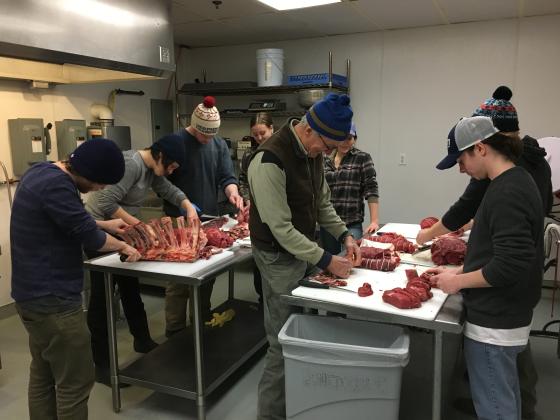Posted March 17, 2022 at 10:36am by Anonymous (not verified)
Educational Contributions to the Food System

Written by Molly Willard
Vermont Tech is one of several educational institutions in Vermont helping to strengthen the food system. In collaboration with other educational institutions, degrees and certificate programs are offered to help meet Vermont’s Farm to Plate food system plan goal to offer a wide range of curricula, certificate and degree programs, and conduct research aimed at meeting the needs of Vermont’s food system. Programs also incorporate environmental stewardship and deliver positive water quality environmental benefits to the state which help meet the Farm to Plate goal to improve overall environmental stewardship to deliver a net environmental benefit to the state. Vermont Tech is collaboratively supporting these two issues as an educational institution.
Agricultural runoff is a targeted pollutant entering Lake Champlain, contributing to high phosphorus levels, resulting in algal blooms and poor water quality. Vermont Tech is actively addressing this issue with innovative technology. The anaerobic digester, Big Bertha, and manure application with draghose technology decreases agricultural run-off. Draghose technology can meet the nitrogen needs of crops while slowing the builds up of phosphorus by spreading the manure thinner. Anaerobic digestion uses raw manure and wastes to create renewable energy and properly manages nutrients. The technology being implemented at Vermont Tech reduces agricultural contributions to poor water quality, while supporting renewable energy initiatives and Act 148, banning organics from landfills by 2020.
Vermont Tech collaborates with The Mad River Food Hub, Shaw’s Grocers and the Vermont Department of Labor (DOL) to offer meat cutting training opportunities funded through DOL Workforce Education and Training Grant program. Meat cutting and processing training courses at the Vermont Tech Institute for Applied Agriculture and Food Systems cover the basics of whole-animal butchery with both instruction and hands-on demonstration. Participants learn how to break down beef, pork, chicken, and lamb into primals, subprimals, and case-ready cuts, as well as how to process value-added products like sausage, smoked hams, and bacon. The trainings emphasize food safety, sourcing, and maintaining high utilization of whole animals. Meat processing jobs are plentiful in Shaw’s stores across New England and students have opportunities to build rapport with representatives from Shaw’s in the trainings.
Collaborative efforts are integral in creating a sustainable agricultural system in Vermont and have supported the development and capacity of educational programs at Vermont Tech. The Vermont Department of Labor and Agency of Agriculture served as partners along with industry experts from Shaw’s and the Mad River Food Hub to offer the meat cutting courses. Green Mountain Power, Vermont Sustainable Jobs Fund, Vermont Environmental Consortium, Central Vermont Solid Waste Management District, and many other agricultural businesses, Vermont farmers, and industry experts have partnered with Vermont Tech to develop, launch, operate, maintain, and feed Big Bertha. Agricultural industry experts and businesses are integral in the development of curriculum and programs delivered from Vermont Tech’s Institute for Applied Agriculture and Food Systems, and the trainings are then taught by experienced practitioners in the given field.
Visit the Vermont Tech Institute for Applied Agriculture and Food Systems for educational programs and trainings at https://www.vtc.edu/meet-vtc/centers-institutes/ag-institute.
